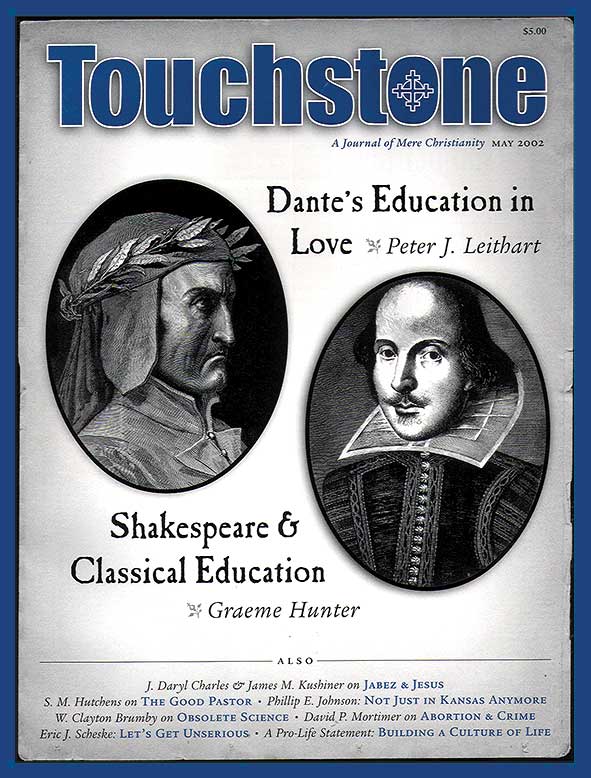The Engulfed Cathedral
The Latest from Sweden’s Avant-Garde Church
by William J. Tighe
In 1998 I reported on a gay “art” exhibition entitled “Ecce Homo” that debuted in Uppsala Cathedral and caused an uproar (“Berserker in the Cathedral,” Touchstone, November/December 1998). Since January 1, 2000, the Church of Sweden has been disestablished as the national church, although in such as way as to keep its liberal elite firmly in charge and to exclude traditionalist orthodox clergy from all hope of preferment (not least by banning the ordination of opponents of the ordination of women). Despite formal disestablishment, however, Uppsala Cathedral and its dean have continued their trailblazing role as promoters of moral and religious “pluralism” in the Church of Sweden. Within the last year there have been three episodes, each attracting considerable public attention, which have signaled their trend-setting role.
The first occurred on Monday of Holy Week, April 9, 2001. A principal feature of the traditional Swedish Lutheran Lent is a series of informal or non-liturgical church services termed Passionsandakter. The service, which was included in the Swedish church’s “Psalmbook” until the 1980s, consisted of hymns; a reading from “Our Lord Jesus Christ’s Passion Story,” a harmony of the four Gospels divided into acts and scenes compiled by Johann Bugenhagen (1485–1558); a sermon; prayers; and additional hymns.
Last Holy Week, the Dean of Uppsala invited Jonas Gardell to conduct a Passionsandakt on the subject of the sufferings of homosexuals from social prejudice. Gardell is a Swedish author and witty stand-up ribald comedian whose satires are often directed against opponents of homosexuality and who himself lives openly with the Finnish singer and storyteller (and convert to Roman Catholicism) Mark Levengood (who refers to Gardell as his “husband”). The title Passionsandakt contained an obvious double entendre on passion, in the sense both of erotic passion and the Passion of the Lord Jesus Christ. The service attracted a good deal of media attention, but worse was to follow.
Lesbian Blessing
For some years Sweden has accorded civil recognition to same-sex “partnerships,” unions that amount in most respects to “homosexual marriages.” In the Church of Sweden, as in other European Lutheran, Old Catholic, and Anglican churches, proposals to recognize and to “bless” such partnerships have occasioned prolonged and heated debates. Ever since the publication in 1994 of a church-sponsored report, “The Church and Homosexuality,” which proposed that while such “unions” were not “marriages” in the Christian sense, the Swedish Church should and could find a way to “bless” them, the matter has been controversial.
Because the disestablishment of the state church has occupied the attention of the Church Assembly from 1995 onwards, the report has never been formally discussed or debated in that body. But the Bishops’ Conference acted some years ago to provide guidelines for pastors to deal with situations in which homosexual couples might seek a church “blessing” for their partnership. These guidelines effectively allowed pastors to hold private ceremonies to bless the unions of same-sex couples who had already registered civil partnerships in accordance with the provisions of Swedish law, and the bishops also devised a “liturgy” for that purpose, which they subsequently distributed to the clergy.
On December 27, 2001, Anna-Karin Hammar, a cleric of the Church of Sweden, an avowed lesbian, and the sister of the archbishop of Uppsala, Karl-Gustav Hammar, registered such a partnership in the office of the mayor of Uppsala. Her partner is Ninna Edgardh Beckman, a divorced lay theologian who obtained her doctorate from Uppsala University after submitting a thesis on the “Feminist Liturgical Movement,” that is, the struggle to banish “patriarchalist language and terminology” from the worship of the Church.
After the registration, the “bridal party” of about 80 persons, including the archbishop, proceeded to the cathedral, where Mass was celebrated. This has caused controversy ever since. For the service to take place, the dean had to give her permission—not a problem, as she has stated that the battle for “homosexual rights” in the church is the “same struggle” as the battle for the ordination of women. But the celebrant at the service was actually the bishop of Lund, Christina Odenberg. (The archbishop was part of the congregation and played no liturgical or ceremonial role.) The booklet given out at the service read, “The Gift of Love: a Mass with intercession for a Registered Partnership,” but care was taken to collect the booklets afterwards, so for a time it remained unclear what had actually transpired.
A few days later, a conservative secular newspaper, Svenska Dagbladet, published a report to the effect that a lesbian couple had been “blessed” at a service in Uppsala Cathedral. Subsequently, a more detailed story appeared in another newspaper, in which the author emphasized the disappearance of the service booklets after the service, as well as its character as a “provocation” of conservative opinion in the church.
Then, the Rev. Dr. Rune Imberg, a conservative “confessionalist” Church of Sweden theologian and warden of the Parish Faculty in Gothenburg (a private foundation), inquired in an article in the Christian newspaper Nya Dagen just exactly what had happened at the service. He suggested that the clergy involved, especially the bishop of Lund, who conducted it, might have broken their ordination vows. The bishop reacted with anger—“like someone stung by a bee,” as one account described it—accusing those who had written about the service of lying. She insisted that what she had done was simply to celebrate an “ordinary Mass” and that the only “blessing” she had pronounced was a general blessing of the congregation at the end, a blessing that, she insisted, would have come upon “the two ladies” along with all the others present.
Then one of the editors of the Church of Sweden newspaper, Kyrkans Tidning, obtained a copy of the service booklet. It was evident that the ceremony had not been an “ordinary Mass,” but had included a candle-lighting ceremony for the new couple, in the course of which they were to give an interpretation of the “vows” that they had just made to one another. The editor demanded “a clarification” from Bishop Odenberg, but to date the bishop’s only response has been to insist that she did nothing wrong or contrary to the guidelines that the Bishops’ Conference had provided for such circumstances. A long-expected report from a committee of the Church Assembly assigned to investigate the “theological status” of such unions was due to be released in March 2002. It was widely rumored that it would propose that an official “wedding-like” ceremony be endorsed. Some commentators have suggested that the report will, in effect, retrospectively vindicate the service in the cathedral.
New Swedish Martyr
The most recent event took place in February 2002, in the context of an outpouring of politically correct sentiment in the aftermath of a true tragedy. A 26-year-old woman, Fadime Suhindal, the daughter of Kurdish Muslim immigrants to Sweden, was murdered by her own father in a sort of “honor killing” (as murders of this sort have been termed). The young woman, a nominal Muslim, and certainly not a baptized Christian, had “secularized” herself in her adolescence and had insisted that she wanted to be Swedish, not Kurdish, in her outlook and culture. Some years earlier she had outraged her family by becoming engaged to (and hence, as in nine out of ten cases of “engagement” in contemporary Sweden, cohabiting with) a Swede. Her father and brother had been convicted of assaulting and beating her at the time. Two years ago her fiancé died in a highway accident, and since that time she had expressed on more than one occasion to her friends the fear that her family would kill her to efface the disgrace that they had incurred by her lifestyle and attitudes. It was alleged after her murder that she had expressed the wish to be buried in a “Swedish ceremony,” not a Muslim one.
The Swedish ceremony was held in Uppsala Cathedral on February 4, and it resembled nothing less than an old-fashioned state funeral for a king or an archbishop. It was televised, and many of those present wept uncontrollably. Two cabinet ministers attended on behalf of the government, as well as the provincial governor and even the crown princess, the heir to the Swedish throne. The dean, Dr. Bylund, in her discourse called the murdered woman “a modern martyr,” as she had embodied what Jesus taught about the rights and roles of women and had acted in “his spirit.” After the service, the casket, which was before the high altar, was borne to the funeral cortege by six women, with a seventh bearing at the head of the procession a large photograph of the dead woman’s face, “as though it had been an icon” in the words of one observer.
But just as the murdered woman had not been in any sense a Christian, so the service itself had been stripped of its Christian elements. There were songs and readings of various sorts, some of the latter from the Bible. But when it came to the blessing of the service, the dean substituted for the prescribed Trinitarian blessing, a blessing “in the Name of God, the Compassionate and Merciful One,” which seemed to come straight out of the Koran, or at least designed not to offend the sensibilities of any Muslims who might be present.
Folke Olofsson, the rector of Rasbo and Rasbokils some ten miles from Uppsala and one of the most prominent and gifted theologians of the Free Synod of the Church of Sweden, the principal “orthodox opposition” group within the church, said Uppsala Cathedral has been “desecrated” by these recent events. Facilis descensus Averni—easy is the descent into the abyss—seems to be an adage that is as true of religious bodies as of individuals, as the example of the Church of Sweden vividly shows.
William J. Tighe was Professor of History at Muhlenberg College in Allentown, Pennsylvania, until his retirement in 2024. He is a member of St. Josaphat Ukrainian Catholic Church in Bethlehem, Pennsylvania.He is a senior editor for Touchstone.
subscription options
Order
Print/Online Subscription

Get six issues (one year) of Touchstone PLUS full online access including pdf downloads for only $39.95. That's only $3.34 per month!
Order
Online Only
Subscription

Get a one-year full-access subscription to the Touchstone online archives for only $19.95. That's only $1.66 per month!
bulk subscriptions
Order Touchstone subscriptions in bulk and save $10 per sub! Each subscription includes 6 issues of Touchstone plus full online access to touchstonemag.com—including archives, videos, and pdf downloads of recent issues for only $29.95 each! Great for churches or study groups.
Transactions will be processed on a secure server.
more from the online archives

31.5—September/October 2018
Errands into the Moral Wilderness
Forms of Christian Family Witness & Renewal by Allan C. Carlson
calling all readers
Please Donate
"There are magazines worth reading but few worth saving . . . Touchstone is just such a magazine."
—Alice von Hildebrand
"Here we do not concede one square millimeter of territory to falsehood, folly, contemporary sentimentality, or fashion. We speak the truth, and let God be our judge. . . . Touchstone is the one committedly Christian conservative journal."
—Anthony Esolen, Touchstone senior editor








